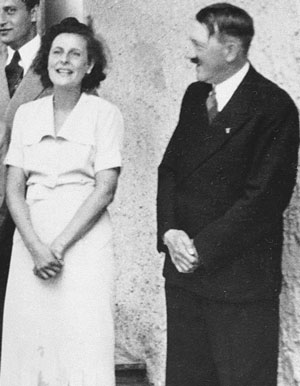Kathryn PIGelow Wins Leni Riefenstahl Award
Press Release
February 10, 2013 | Revolution Newspaper | revcom.us
Editor’s Note:
We received the following from the Committee for Sanitizing Crimes Against Humanity in Film.
02/02/2013: For immediate distribution
LENI RIEFENSTAHL AWARD TO KATHRYN PIGELOW
On February 2, 2013, the Committee for Sanitizing Crimes Against Humanity in Film announced the winner of the Leni Riefenstahl Award: director Kathryn PIGelow for her film Zero Dark Thirty, and her body of work and role in impacting public opinion.

German film director Leni Riefenstahl, left, with Nazi dictator Adolf Hitler in 1938. Her film Triumph of the Will, made in 1934, glorified the Nazi regime and was part of the propaganda effort by the Nazis to win people to support and comply with Nazi crimes against humanity. Riefenstahl said Hitler chose her to direct the film because "He wanted a film which would move, appeal to, impress an audience which was not necessarily interested in politics." Photo: AP
The award is inspired by the role and work of the German film director and actress Leni Riefenstahl, whose film Triumph of the Will celebrated and legitimized the 1934 Nazi Party congress in Nuremberg. That congress introduced laws that would encode anti-Semitism in Germany, setting the stage for the Holocaust, and was a launching point for Germany’s aggressive imperialist wars. Riefenstahl’s film helped convince some in Germany’s influential arts and culture community to acquiesce in Hitler’s crimes with passive complicity and active support. Riefenstahl is acclaimed by many prestigious commentators and critics, who while conditioning their praise with disclaimers about not endorsing the Nazis and genocide, insist that those flaws should not color judgment of her work, and call her “the greatest female filmmaker of the 20th century” and an “acclaimed pioneer of film and photographic techniques.”
As the Committee’s charter emphasizes, “Leni Riefenstahl did nothing less than make Hitler seem honorable and inspiring to sections of the German public who at first dismissed him as a fascist mad man.”
While that is a high bar from which to judge, the Committee felt strongly that PIGelow’s work rises to that standard. In granting the award, the Committee noted “It is an amazing accomplishment for a film to sanitize the CIA, humanize it, and portray those who carry out torture as heroes with whom the viewer would identify and empathize.” And the Committee expressed its appreciation that the Hollywood community, with a small number of disturbing exceptions, has embraced Zero Dark Thirty.
In recognizing PIGelow for the Leni Riefenstahl award, the committee noted the societal impact of Zero Dark Thirty in making acceptable (including by portraying as “complicated”) the use of torture against “America’s enemies,” in winning liberal audiences to sympathize with criminal monsters who carry out torture, and in rebranding the CIA’s image of cold-blooded imperialist assassins into “dedicated men and women” in the “intelligence community” who are keeping Americans safe.
The committee also acknowledged the work of Ben Affleck, whose film Argo was recognized for its work minimizing and obscuring the role of the CIA in installing the Shah of Iran, who, as a U.S. puppet, filled dungeons and torture chambers with dissidents for decades in service of U.S. economic, political, and military interests, and obscuring the role of the U.S. Embassy in Iran as an operations center for the CIA and related U.S. agencies. However, after careful consideration, the committee awarded the Leni Riefenstahl prize to PIGelow on the basis of her body of work—having two films to her credit that promoted imperialist aggression, war, torture, and the dehumanization of “America’s enemies” (PIGelow’s other contribution being her film Hurt Locker).
If you like this article, subscribe, donate to and sustain Revolution newspaper.